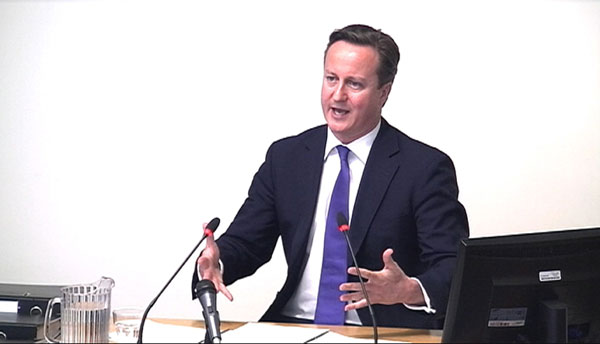
|
 |
| A still video image shows David Cameron as he gives evidence to the Leveson Inquiry at the High Court in London.[Photo/Agencies] |
LONDON - Rupert Murdoch's UK newspaper chief told David Cameron the night before a crucial political speech in 2009 that they were "professionally in this together", an inquiry revealed on Thursday, embarrassing the man who now governs Britain.
A text message to Cameron, then in opposition, from Rebekah Brooks, then the head of Murdoch's British newspapers, was read out to the prime minister on live television during a grilling about his ties to the tycoon's News Corp.
"I am so rooting for you tomorrow not just as a personal friend but because professionally we're definitely in this together. Speech of your life? Yes he Cam!" Brooks told Cameron in that message the night before his speech to the Conservative Party's annual conference.
Testifying under oath at the Leveson Inquiry into media ethics, Cameron said Brooks had merely meant that they had a common interest because her Sun newspaper had come out in support of the Conservative Party ahead of the 2010 election.
But the message makes excruciating reading for Cameron as "We're all in this together" was the Conservatives' campaign slogan for that election. It was meant to present the party as inclusive and caring, but the Brooks message instead reinforces the perception of a party in thrall to a powerful media clique.
"Yes he Cam" was the Sun's headline the day after he made the 2009 speech, suggesting Brooks had decided how the newspaper would react to the speech before it was made.
Brooks quit her News Corp job last year over phone-hacking by reporters on her watch and has since been charged with perverting the course of justice for allegedly hiding evidence.
"WITCHCRAFT TRIALS"
Cameron ordered the Leveson Inquiry last year at a time when he was under pressure to crack down on Murdoch's papers because of the revelation that reporters at the News of the World tabloid had hacked into the phone of a murdered schoolgirl.
But if Cameron had hoped the inquiry might neuter the hacking scandal, it has done the opposite by producing evidence that has raised doubts about his own judgment and caused a rift with his Liberal Democrat coalition partners.
These problems have absorbed his time and energy at a time when he is also grappling with a recession, unpopular public spending cuts and the euro zone crisis. On Thursday, he spent five hours answering questions at Leveson.
The inquiry has shown generations of politicians from both of Britain's main parties, Labour and the Conservatives, have fawned over Murdoch and people close to him.
Cameron used to sign his frequent text messages to Brooks with an affectionate "LOL", which he thought stood for "lots of love", according to Brooks's own testimony at Leveson, but his two Labour predecessors courted her just as assiduously.
Tony Blair had several private dinners with her and sent her friendly text messages, while during Gordon Brown's time as prime minister, his wife Sarah invited Brooks to "sleepover parties" at Brown's official weekend retreat.
Cameron repeatedly pointed the finger at Labour during his testimony. He dismissed as a "conspiracy theory" an accusation by Brown that the Conservatives had discreetly championed Murdoch's interests in return for support from his newspapers.
"Not only was there no covert deal, there was no overt deal, and there wasn't ‘nods and winks'," Cameron said, jabbing his hand forward to emphasise the point.
He rejected the suggestion that while there may have been no explicit deal, there was an unspoken and mutually beneficial agreement between his party and the Murdoch press.
"We do slightly get into sort of witchcraft trials. How do you possibly prove that you're innocent on that basis?" he said.
WEEKENDS IN THE COUNTRY
Cameron spoke fluently but looked tense at the inquiry. He frowned in concentration as he listened to questions from lawyer Robert Jay, in contrast to his usually relaxed manner.
But his efforts were undermined when Jay read out the 2009 text message from Brooks, which referred to a problem Cameron had at the time with another Murdoch paper and suggested that he and Brooks should discuss the matter "over country supper".
The phrase is embarrassing for Cameron, who used to socialise with Brooks and other rich and powerful people connected to Murdoch during weekends at their respective mansions in a picturesque corner of the Oxfordshire countryside.
Cameron squirmed as Jay pressed him to say how often he used to meet up with Brooks in the country.
"Not every weekend ... I'd have to check. I might be able to go back and check. But I don't think every weekend. I don't think most weekends. But it would depend."
For British voters, talk of meetings "over country supper" only reinforces Cameron's image as a man of wealth and privilege who has little understanding of ordinary people's lives - an image he has tried hard to counteract, downplaying his elite upbringing at Eton, an expensive boarding school.